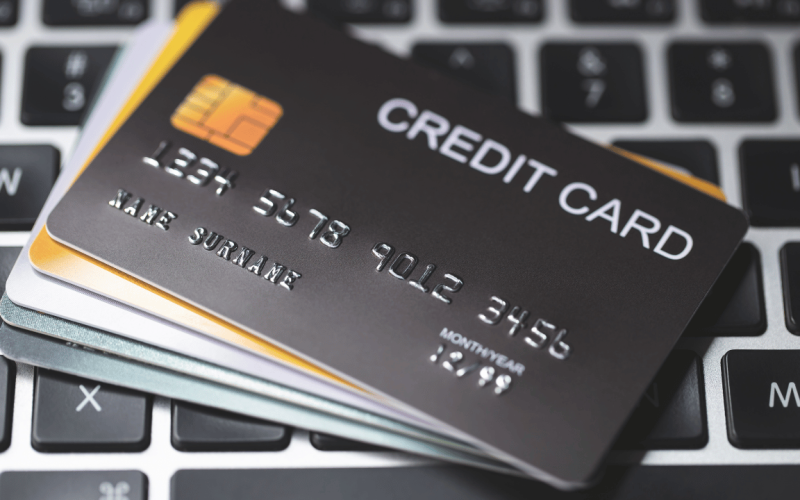Ever wondered how some people seem to travel the world for free or afford lavish lifestyles without a six-figure salary? The secret lies in how they use credit cards.
If you’ve been wary of credit cards because of high-interest rates or fees, it’s time to change your perspective.
Used responsibly, credit cards can be powerful tools to build wealth over time through rewards and benefits.
Keep reading to learn how you can use your credit cards wisely to afford the lifestyle you want.
The key is understanding how to use credit card rewards to your advantage. If I can do it, so can you.
How I Use My Credit Cards Wisely to Build Wealth
Using credit cards wisely can help you build wealth through cash back, travel rewards, and other perks.
Here’s how is how to leverage your cards to maximize benefits:
1. Choose the Right Credit Cards for Your Spending
To make the most of your credit cards, you need the right ones for spending.
Look for cards that offer bonus rewards in the areas where you spend the most. If you’re a frequent flyer, a travel card with miles or points on every purchase is ideal.
For gas and groceries, a cash-back card may be better to earn back a percentage of your spending.
Have more than one card for different types of expenses. I use one card exclusively for business costs to keep expenses separate.
And I have another card just for online shopping since I do a lot from home. Using specific cards for certain spending helps me stay organized and maximize my rewards.
Consider rotating cards for the biggest bonus. Some cards offer huge sign-up bonuses if you spend a certain amount within the first 3 months.
I’ll use that card for all my purchases during that period to earn the bonus, then switch back to my usual cards after I qualify. It’s an easy way to rack up many points or miles simultaneously.
Look for cards with bonus categories that change. Some cards offer 5% cash back or extra points at places that rotate each quarter, like gas stations, restaurants, or grocery stores.
Make it a habit to check which bonus categories your cards are offering so you can adjust where you use them to save the most.
With the right combination of credit cards for your lifestyle, you’ll earn valuable rewards on all your spending in no time.
2. Pay Off Balances in Full Each Month
Paying off your credit card balances in full each month is one of the smartest things you can do for your finances.
Avoid Interest Charges
When you carry a balance from month to month, interest charges pile up quickly.
Credit card interest rates are often over 15% APR, some as high as 25% or more.
Paying interest reduces the amount that goes toward paying down your actual balance.
Build Your Credit Score
Keeping low balances relative to your limits and paying on time each month are two of the biggest factors in your credit score.
High credit scores mean you qualify for the best interest rates on mortgages, auto loans, and other financing. Paying in full and on time is the fastest way to build your score.
Stay Out of Debt
Revolving debt, like credit cards, can be an endless cycle of minimum payments and interest charges that keep you in debt for years.
Paying the full amount due each billing cycle helps ensure you don’t fall into the debt trap many people struggle with.
Earn More Rewards
If you have rewards credit cards, paying the balance in full allows you to earn points, miles, or cash back without paying interest charges.
The rewards you earn can add up to hundreds or even thousands of dollars annually if you use your cards regularly for all your spending.
3. Use Credit Card Rewards and Cash Back
One of the best ways to wisely build wealth with credit cards is by earning rewards and cashback on your spending.
Choose a card that offers rewards in categories you spend the most, like travel, dining out, or gas.
Here are more tips for using credit card rewards:
- Look for a card with 3-5% back in your top spending categories and 1-2% on other purchases. Over time, those small percentages add up to hundreds or even thousands of dollars in yearly rewards.
- Redeem your rewards for statement credits, gift cards, merchandise, or travel. I like using my rewards for travel since I can often get a better value. For example, 50,000 points might be worth $500 in travel but only $400 in gift cards.
- See if your card offers bonus rewards for shopping through their online portal. Some cards give additional points for shopping at certain stores. It only takes a few extra clicks but can mean more rewards.
- Don’t carry a balance from month to month, or interest charges will quickly wipe out the value of any rewards you earn. Pay the full statement balance on time each billing cycle.
4. Redeem Rewards for Maximum Value
Once you’ve earned rewards from regular spending on your credit cards, it’s time to redeem them for the best possible value.
Here are some tips to maximize your redemption value:
Compare Redemption Options
Review the rewards catalog for your cards and compare the value you can get for your points or miles.
Some cards offer gift cards, travel, merchandise, or statement credits. Calculate the redemption rate for each to determine the best deal.
For example, 50,000 points might be worth $500 in gift cards but $700 in travel.
Transfer to Travel Partners
If your card allows points transfers to airline or hotel partners, this can potentially provide the highest value. 50,000 points could be worth $1,000 or more in flights or hotel stays.
Research partner award charts to find the best redemptions before transferring.
Popular partners include major airlines like United, Delta, and American Airlines.
Look For Redemption Bonuses
Watch for temporary point redemption bonuses that increase your points’ value by 25-100%.
For example, a card may run a promotion offering a 50% bonus when redeeming points for travel, dining, or other categories.
This is a great time to redeem if there’s an option you can use.
Consider Non-travel Redemptions
Travel redemptions typically provide the highest value. But sometimes, you might not feel like traveling or may not have a trip planned.
That’s okay! You can do other things with your rewards that are still good.
One option is to get gift cards. Gift cards are special money you can only use at certain stores or restaurants.
If you have rewards, you can use them to get gift cards for places you usually shop.
Another option is to get statement credits. Statement credits provide a direct cash value that you can use to pay down part of your balance.
Let’s say you owe $50 on your credit card but have rewards worth $10. You can use those rewards as a statement credit, which means the credit card company will take $10 off your bill. So instead of owing $50, you would only owe $40.
6. Monitor Your Credit and Make Timely Payments
Monitoring your credit and making timely payments is key to using credit cards wisely.
Check Your Credit Report Regularly
Review your credit report from each bureau at least once a year to check for any errors or signs of fraud.
You can get free reports from AnnualCreditReport.com. Look for incorrectly listed debts, inaccurately reported late or missed payments or other red flags.
Dispute these with the credit bureaus right away to get them corrected.
Set Up Automatic Payments
The easiest way to avoid late fees and potential hits to your credit is by enabling auto-pay for at least the minimum payment.
Schedule payments for a few days before the due date to account for any processing time.
You can always pay more than the minimum if you want. If there are any months you need to skip or pay less, just update or cancel the auto-pay for that period.
Pay on Time Each Month
Make sure payments for all your credit cards and other debts are made on or before the due date of each billing cycle.
Payment history is the largest factor in your credit scores, making up 35% of your FICO score.
Late or missed payments severely damage your credit and stay on your credit report for up to 7 years.
Keep Low Credit Utilization Ratios
Keep your credit card balances low relative to your credit limits. High utilization ratios, especially if over 30% of your limit, hurt your credit scores.
Make extra payments throughout the billing cycle or pay the full monthly balance to keep utilization in check.
You can ask your card issuers to increase your credit limits to improve your utilization ratios if needed.
Conclusion
So there you have a few simple strategies for using credit cards to build wealth wisely instead of debt.
By choosing the right cards, maximizing rewards, paying balances in full, and redeeming points strategically, your credit cards can become one of your most powerful money-making tools.
Staying on top of these good habits will build wealth through the credit you establish and the money you save on interest and fees.
It may seem counterintuitive, but credit cards are one of the few ways to spend money and still come out ahead when used responsibly.
With some time and practice, you’ll be well on your way to turning everyday expenses into opportunities to earn free travel, cash back, and more.
So start rethinking how you use credit and open your mind to the possibility that credit cards could be the key to funding your next adventure or padding your savings account.






![How To Start A Curtain Business - [Complete Guide]](https://www.saharamagnate.com/wp-content/uploads/2023/05/How-To-Start-A-Curtain-Business-380x220.png)